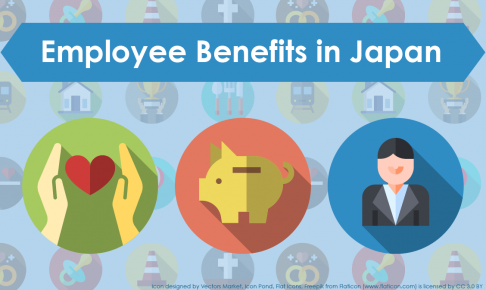
When a job description offers “comprehensive benefits,” what does that actually mean? If you’re new to working in Japan or are thinking about changing your contract between part-time and full-time, be sure to keep reading to find out what you can expect when accepting a job offer.
- Legally required employee benefits in Japan
- How legally required benefits affect your paycheck
- Basic employee benefits (decided by the employer)
- Life event benefits (decided by the employer)
- 3 Types of Employment in Japan
- What’s the benefit of working in Japan?
Legally required employee benefits in Japan
With a comprehensive social welfare system, convenient public transportation, and growing employment opportunities for foreigners, there are a lot of great reasons to consider making Japan your new home. But when it comes time to search for a job, it’s very important to know what employee benefits you’re legally entitled to.
Insurance benefits
There are three standard insurance benefits required by Japanese law that must be offered to all full-time workers who work more than 30 hours a week.
- Health insurance
- Unemployment / compensation insurance
- Welfare insurance
As you may know, Japan provides a national health insurance system that every permanent resident (both citizens and visa holders) must participate in. If you are hired full-time, your employer is required to offer this health benefit to each employee through a health and pension program called “shakai hoken” (社会保険).
However, don’t be surprised if your paycheck is lower than what you agreed to for your salary, because these mandatory benefits are deducted from your wages each month. Also, the amounts vary depending on your income, so be sure to look at your monthly payslip called “kyuyomeisai” (給与明細) to see a breakdown of what you’re paying.
Paid time off
 Employers are also required by law to provide each full-time employee with paid time off called “yukyu.” (有給) In Japan, there is no legal requirement for separating paid leave, so vacation days, sick days, and short-term family medical leave all fall under the 10 days of paid time off provided each year.
Employers are also required by law to provide each full-time employee with paid time off called “yukyu.” (有給) In Japan, there is no legal requirement for separating paid leave, so vacation days, sick days, and short-term family medical leave all fall under the 10 days of paid time off provided each year.
It is important to understand that while technically you are legally allowed to take these days off any time you want, Japanese business culture is one where employees use paid time off sparingly if at all.
This benefit does not include paid public holidays or other paid holidays decided by the employer, such as Golden Week (a series of consecutive national holidays during the first week of May) and “Oshogatsu” (the days before and after the Japanese New Year). Teaching jobs and other jobs with a high percentage of foreign workers are often given extra paid holidays around these times.
How legally required benefits affect your paycheck
What do legally required benefits mean for your daily life? Unfortunately, it means money out of your pocket. Deductions for insurance, pension, and income/municipal taxes can eat away at your paycheck considerably, and almost all are calculated based on your income (i.e., the more you make, the more you pay).
For example, consider an annual salary of ¥3 million (without bonuses), which is the most common yearly salary for Japanese workers (approximately 20%). With a 10% income tax rate, as well as residence tax and social insurance, your monthly take-home pay drops to ¥1.8 – ¥2.4 million (or ¥152,000 – ¥200,000 / month).
| Annual Base Salary | ¥3,000,000 |
| Income Tax | ¥300,000 |
| Residence Tax | ¥164,000 |
| Social Insurance | ¥449,000 |
| Take-home Pay | ¥2,087,000 |
Take-home pay can drop even more when you have no additional support from your company, such as in the case of part-time workers and some small companies who can’t afford the comprehensive benefits packages provided by larger companies.
Basic employee benefits (decided by the employer)

Legally required benefits for the employee in Japan
Some Japanese companies may offer additional benefits beyond those that are legally required, in order to attract potential employees.
The most common benefit you may be offered is transportation reimbursement to and from work. This can come in the form of a monthly commuter pass with unlimited travel between two stations (called a “teiki” 定期), or reimbursements for single trips (often when multiple locations are needed for a single job).
Each company will handle the transportation benefit differently and there may be a limit to how much you get each month, so be sure to ask what the limit is if you are offered this benefit. Also, you may want to avoid mentioning that you plan to bike or walk to work each day as the company policy may exclude transportation reimbursements in these cases. (This means you may end up paying for transportation costs out of your own pocket whenever it rains).
Other optional company benefits may include:
- Relocation assistance (overseas or within Japan)
- Housing assistance / stipend
- Yearly medical checkup, “kenko shindan” (健康診断)
Some employers will also offer educational assistance or reimbursements for continued professional education, though these benefits are not as common as the others mentioned above.
Life event benefits (decided by the employer)
Around 90% of large Japanese companies offer a fringe benefit called “Keicho” (慶弔) benefits. These are cash donations from the company for special events in your life. Life events that qualify include:
- Marriage
- Injury or major illness
- Death in the family
- Having a child
Additionally, most companies carry on the old Japanese tradition of providing semiannual bonuses equal to one month’s salary. In job descriptions, this is often written as “monthly salary paid 14 times a year,” and it can make a huge difference to your quality of life and work satisfaction if you are given this benefit.
3 Types of Employment in Japan
There are three types of employment in Japan.
- Full-time, permanent employee (Sei-shain)
- Contract / temporary employee (keiyaku-shain / haken-shain)
- Part-time employee (paato / aru-baito).
Full-time vs. part-time employee benefits in Japan
The difference between a full-time and part-time employee is whether or not your hours match with the company’s legal expectation of work. That means if the company’s legal full-time contracts are 45 hours a week, working 40 hours a week still makes you technically a part-time employee.
No matter your level of employment, you are eligible to receive social insurance benefits if you satisfy ANY of the following rules:
- You work +20 hours a week
- Your monthly salary is over ¥88,000
- You are expected to work at least 1 year
- Your company employs over 501 people.
The last one is important as it means many small companies are not required by law to offer the same benefits as working for a large company.
Many part-time employees and contractors also usually don’t receive raises or bonuses, and are less likely to receive benefits than full-time, permanent employees, like housing, welfare, or relocation assistance. However, most companies do still pay transportation not matter what type of employment you are considered.
What’s the benefit of working in Japan?
Overall, it’s important to understand the benefits being offered to you before accepting a job as they can make or break your living situation in Japan. With the information above, you should be able to better understand your legal rights as an employee and know whether or not a company is trying to take advantage of you. There’s no such thing as too much information when it comes to your own finances!
If you’ve ever worked for a company that ignored legal benefit requirements or joined a dream company that gave you amazing perks, let us know in the comments below how it affected your life in Japan!


















How fascinating to learn that japan will offer a national health insurance system to visa holders. A friend of mine was offered to wok in Japan, and I wanted to know the benefits of working there. After reading the article, I will consider the invite as well since it sounds profitable.